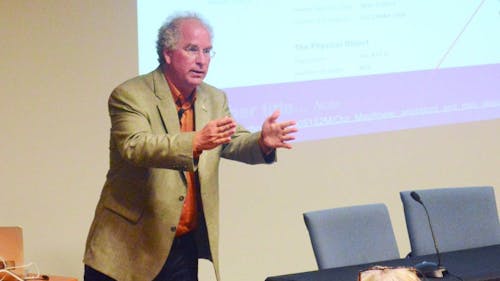Founder of Internet Archive Brewster Kahle 'bytes' into dream of making all information public, free on Internet

Under New Brunswick's sky, an Internet Hall of Famer stood on the stone steps of the New Brunswick Free Public Library, then pulled open the heavy wooden doors. Later, he made his way to another library, Alexander Library, where he shared his dream of bringing libraries to everything — except, he said, he would do it through a screen.
Yesterday, about 75 students, professors and avid fans sat in Alexander Library on the College Avenue campus to listen to Brewster Kahle, 54, best known for founding a non-profit digital library, the Internet Archive, speak of his successes and his ambitions.
The advocate, entrepreneur and Massachusetts Institute of Technology graduate spoke of his future plans for moving forward with his task of making knowledge universally accessible — he already made significant strides by providing free public access to music, movies, software, applications and more than 3 million books with the Internet Archive.
“Can we make it so that everything ever published is available to anyone at any time?" he asked. "Yes, you can, and it’s possible by our generation."
Accomplishing this, he said, was his dream since the mid-1980s.
Although Kahle wants every published word on the Internet, his ambition began traditionally — with a brick and mortar library.
Aside from the contents of libraries, he likes to pause and read the inscriptions above library doors — he said his favorite is the inscription "Free to All," a saying etched on the Boston Public Library.
Now, as Kahle steadily works toward curating a digital library, he and his team works to digitize about 1,000 books everyday in 30 different scanning centers around the world in eight countries.
"Even if you scan books, you can always print them back out again," Kahle said. “But I think everything is just going to be on screens. They look beautiful, (and) they don’t have to be reformatted.”
Ultimately, the main goal is to get big libraries — like the Library of Congress — and make them available to everyone, in every language and every medium.
“People tend to think, ‘Hey, hasn’t Google done a lot of this?’ And yeah, they have, but they locked it up,” he said. “They took the public domain and but restrictions on it, often at the instance of libraries.”
If Google is the Microsoft, the Internet Archive is the Linux, he said, referring to the operating system's free, open-source development and distribution.
He said that his team has about 8 million books left to make into lending books after buying them.
He has a focus on making music available to the public for free as well, an endeavor he started in the early 2000s by using The Grateful Dead as a platform. The rule, he said, was that anyone could share, but no one could make money.
He contacted The Grateful Dead, he said, explaining he could digitize everything about them on the Web — including recording of concerts, songs and shows — and make them “forever for everyone.”
“They wrote back and they said, ‘We don’t believe you, but if you could do it, it would be our dream,” Kahle said. “When someone says, ‘If you could do this, it would be our dream?’ Isn’t that the most motivating thing?”
Soon, they began collecting all different bands.
Around a decade later, Kahle added up 6,000 bands with digitized recordings, with 2 million items in more than 5,000 collections, ranging from Afropop Worldwide, a radio program dedicated to music of the African diaspora, to presidential speeches.
He soon moved on to digitizing films and TV.
Then, in 2007, his surge with putting books, music and movies online was almost cut short.
Kahle received a National Security Letter from the FBI demanding information from him, which almost stopped him from moving forward with his dream of making everything public and free for all.
He decided to sue the United States government — and won, when the FBI decided to not pursue the information they were originally looking for.
"Universal access to all knowledge can be done, and I think it’s the opportunity of our generation," Kahle said.



